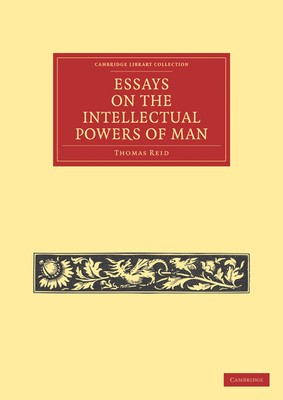
- We will send in 10–14 business days.
- Author: Thomas Reid
- Publisher: Cambridge University Press
- ISBN-10: 1108029698
- ISBN-13: 9781108029698
- Format: 21 x 29.7 x 4 cm, minkšti viršeliai
- Language: English
- SAVE -10% with code: EXTRA
Reviews
Description
Thomas Reid (1710-1796) was a philosopher who founded the Scottish school of 'common sense'. Much of Reid's work is a critique of his contemporary, David Hume (1711-1776), whose empiricism he rejects. In this work, written after Reid's appointment to a professorship at the university of Glasgow, and published in 1785, he turns his attention to ideas about perception, memory, conception, abstraction, judgement, reasoning and taste. He examines the work of his predecessors and contemporaries, arguing that 'when we find philosophers maintaining that there is no heat in the fire, nor colour in the rainbow ... we may be apt to think the whole to be only a dream of fanciful men, who have entangled themselves in cobwebs spun out of their own brain'. Written by one of the Scottish Enlightenment's most important thinkers, this work brings to life the intellectual debates of the time.
EXTRA 10 % discount with code: EXTRA
The promotion ends in 23d.05:07:46
The discount code is valid when purchasing from 10 €. Discounts do not stack.
- Author: Thomas Reid
- Publisher: Cambridge University Press
- ISBN-10: 1108029698
- ISBN-13: 9781108029698
- Format: 21 x 29.7 x 4 cm, minkšti viršeliai
- Language: English English
Thomas Reid (1710-1796) was a philosopher who founded the Scottish school of 'common sense'. Much of Reid's work is a critique of his contemporary, David Hume (1711-1776), whose empiricism he rejects. In this work, written after Reid's appointment to a professorship at the university of Glasgow, and published in 1785, he turns his attention to ideas about perception, memory, conception, abstraction, judgement, reasoning and taste. He examines the work of his predecessors and contemporaries, arguing that 'when we find philosophers maintaining that there is no heat in the fire, nor colour in the rainbow ... we may be apt to think the whole to be only a dream of fanciful men, who have entangled themselves in cobwebs spun out of their own brain'. Written by one of the Scottish Enlightenment's most important thinkers, this work brings to life the intellectual debates of the time.


Reviews